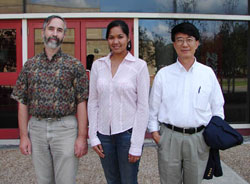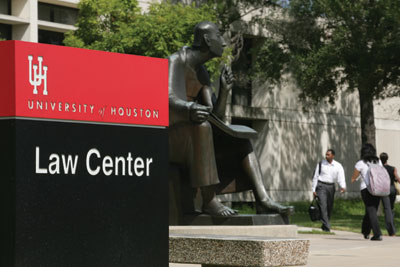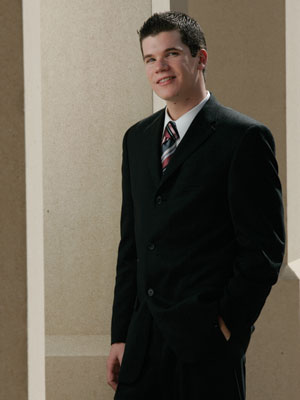UH lands $9.9M grant to help ESL students
For students learning English as a second language (ESL), there are two distinct challenges: learning the language and mastering the concepts taught in the new language. Professor David Francis and his colleagues at the Texas Institute for Measurement, Evaluation, and Statistics have collaborated for years with researchers at Harvard, the Center for Applied Linguistics, the California State University at Long Beach, and The University of Texas at Austin on how ESL students best learn to read. Now they’ve received a $9.9 million grant from the U.S. Department of Education’s Institute of Education Sciences to find ways to help students in upper elementary and middle school grades—where “reading to learn” is crucial to academic success in literature, math, science, and social studies. |
UH joins prestigious air research group
Research on climate change, weather patterns, and air quality has gone on quietly and steadily at UH for years. But now a prestigious national group has recognized the relevance—and excellence—of the university’s atmospheric sciences program. The University Corporation for Atmospheric Research has named UH its newest member. Membership will help attract even more outstanding scholars to the university’s new graduate degree programs in atmospheric sciences. Investigations of the Earth’s air quality, ocean circulation, and weather systems also will lead to improved conditions and quality of life and will help attract more students to earth sciences. |
Kinesiology Ph.D. breaks into top ranks A focus on health-related issues has earned the six-year-old doctoral program in kinesiology respect, as evidenced by its ranking—fifteenth in the country—by the American Academy of Kinesiology and Physical Education. Ten faculty members in the College of Education’s Health and Human Performance Department, many with research collaborations at NASA and/or Texas Medical Center entities, oversee students’ progress. The program focuses on three areas: motor behavior, physiology, and sociocultural influences on physical activity and obesity.
“Cougar Fund” outpaces S&P 500 for fifth year
They’re investing with real money, and beating the market, to boot. For the fifth year running, savvy Bauer College MBA students have chosen up-and-coming stocks and shepherded them to profits through the Cougar Investment Fund L.L.C., which has outperformed the S&P 500 since its inception in 2002.
Selected from a competitive pool for their academic qualifications and professional backgrounds, the students in the Graduate Certificate in Financial (CIF) Services Management Program nose out undervalued stocks, track them, then purchase and manage them. Key to the CIF team’s success is their experience and maturity—they average five years of full-time work experience and hail from backgrounds in accounting, finance, technology, science, engineering, and more.
“Our students face the same pressures as professional investment managers, and their track record is better than that of most professionals,” says Tom George, professor of finance and director of Bauer’s AIM Center for Investment Management.
Today, the Cougar Fund is valued at $6.5 million, up 51 percent from 2002 and beats the S&P 500 Index by 20 percentage points.
Physics student takes aim to revolutionize electronic memory
Could your MP3 player be faster and more efficient? Award-winning student researcher Clarina de la Cruz thinks so.
The fourth-year graduate student in physics won first place for her solid-state physics research. Her competition in the 50th Magnetism and Magnetic Materials Conference hailed from the Radboud University Nijmegen (the Netherlands), Stanford University, and Johns Hopkins University.
Her research has yielded promising results, says her thesis advisor, Paul C.W. Chu, T.L.L. Temple Foundation Chair in Science, physics professor, and founding and executive director of the Texas Center for Superconductivity at the University of Houston. De la Cruz’s research in magneto-electric properties of multiferroic compounds concerns the interplay of magnetism and electricity, and it may lead to the development of a new type of memory storage device that could be used in computers as a magneto-electric hard drive or for speeding up hand-held devices.

|
Grad students’ magnetics research attracts nation’s top labs
Call it magnetism—on a tiny, tiny scale. Four talented engineering students are conducting research with Navy personnel that may yield devices to detect land mines or biological agents.
Graduate students Long Chang, Barry Craver, Ariel Ruiz, and Darren Smith—members of the Cullen College of Engineering’s Nanoscale Interdisciplinary Research Team—completed National Science Foundation-funded fellowships this summer at the U.S. Naval Research Laboratory and at the Naval Air Warfare Center Weapons Division. Their research focus is nanomagnetics, which looks at magnetic materials at the near-atomic level and has practical applications in public safety, wartime tactics, and computer memory durability. The students, who were paired with mentors, worked in either Washington, D.C., or China Lake, California.
Dmitri Litvinov, associate professor of electrical and computer engineering, pursued the program to expand collaborative research ventures with the U.S. Naval Research Laboratory, one of the nation’s top research organizations. |
Law Center earns two major competition titles
UH law students are making a name for themselves worldwide. A trio from the UH Law Center recently bested twelve other teams in the Judge John R. Brown Admiralty Law Competition—a test of maritime legal knowledge. Charlie Lestage, Howard Marshall, and Jim Nye took top honors in the national competition. The team also won “Best Brief” and Nye was named best speaker in the championship round. Team UH Law Center also claimed an international mediation title in Paris. |
 |
Center spells relief for consumer headaches
If you can’t say something nice about a product or service purchased in Texas, say it to the trained students and staff at the Texas Consumer Complaint Center. Established by the UH Center for Consumer Law with part of a $364,000 grant from the Texas attorney general’s office, the center helps Texas consumers navigate issues like defective goods or services, debt collectors, ID theft, landlord/tenant problems, and bankruptcy. |
UHPD, Engineering test “smart” cop cars
No one ever accused a police car of being dumb, but the UH Police Department has been testing one that can safely be called “smart.” Researchers at the Cullen College of Engineering’s Southwest Public Safety Technology Center are testing a refitted Ford Crown Victoria, complete with an interactive computer that seamlessly integrates systems such as lighting, sirens, and data access. Instead of having to push several buttons in a hurry, the officer gives a voice command to turn on the lights and siren |
Liu’s research shortens construction time, cost
Professor Richard Liu, working with several graduate students, has invented a “divining rod” of sorts to measure the thickness of concrete in roadways. It’s a cheaper, more efficient way to ensure the highways are safe. His ground-penetrating radar device rolls along highways to quickly and accurately measure whether they meet safety standards for thickness and moisture content. Already in use, the device is going into wider production and will be used soon throughout Texas.
“Peace Jam,” sign of things to come for social work
ast November, hundreds of area high school students converged on the UH campus to learn from Adolfo Perez Esquivel, 1980 Nobel Peace Prize Laureate. “Peace Jam” is among the major events advancing the Graduate College of Social Work’s focus on peace and justice—an initiative jump-started by Jody Williams, Nobel Peace Prize Laureate and visiting professor. Peace Jam was designed to encourage high school students to envision and plan for a peaceful future through small group discussions and community service projects. |
 |
First UH System student regent named
Opportunity knocked for Robert Johnson, then a second-year law student, when he was appointed to the UH System Board of Regents by Texas Governor Rick Perry. Johnson earned the honor of becoming the university’s first student appointed to the board by having shown poise and knowledge in his appearances on local television and in a press conference with Greg Abbott, Texas attorney general. Abbott was so impressed with Johnson that he hired him as a summer intern. Johnson, currently a third-year law student, is set to take the Texas Bar Exam in July. |
|
